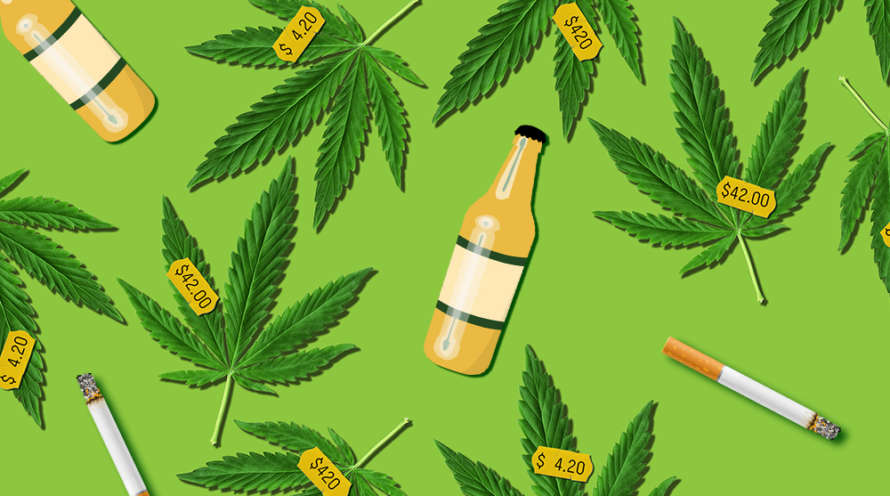Advocates of marijuana often make the claim that marijuana use is less dangerous than alcohol and tobacco use – and according to the latest research, that’s probably true.
However, that doesn’t mean that marijuana doesn’t have any risks at all, or that every method of consuming it is as safe as any other. It’s also true that research into the effects of marijuana has been limited by the fact that it’s still a Schedule I drug on the federal level.
More research will provide more conclusive answers. For now, let’s take a look at how alcohol, tobacco, and marijuana use compares across several different categories.
Can you die from a marijuana overdose?
The good news for marijuana users is that it’s virtually unheard of to overdose from cannabis. Even though the potency of marijuana has increased over the past few decades, and the easy access to edibles in some states has led to a rise in hospital visits, there are still no reported overdoses from marijuana use alone.
On the other hand, there are an average of 6 alcohol overdoses per day in the U.S., or around 2,200 per year, according to the CDC. That’s partly because a lethal dose of alcohol is only 10 times higher than the “effective dose,” or the amount it takes to feel the effects.
Nicotine also carries a risk of overdose, although it’s unlikely you’d ingest a fatal amount from smoking cigarettes alone. Most cases of nicotine poisoning result from nicotine gum, patches, or chewing tobacco, or from swallowing the liquid nicotine used in e-cigarettes.
Driving Under the Influence of Marijuana
Another consideration when comparing the effects of alcohol, tobacco, and marijuana is the risk of driving under the influence. Tobacco is not typically considered a risk while driving, and in fact nicotine may actually improve driving performance by acting as a stimulant. Alcohol, however, contributes to over 10,000 deaths on the road each year.
How does marijuana compare? While drivers under the influence of alcohol and marijuana both show slower reaction times, alcohol is linked to a higher risk of fatal crashes. Driving under the influence of marijuana contributes to makes drivers 1.83 ties as dangerous as other drivers, while alcohol makes drivers 13.64 times as dangerous, according to a recent Columbia University study. This may be because alcohol leads people to drive quickly and recklessly, while drivers under the influence of cannabis are less likely to drive in risky ways.
Long-Term Health Effects of Cannabis
Alcohol, tobacco, and marijuana all have long-term health effects. Tobacco use causes more preventable deaths than any other substance — nearly 500,000 deaths per year in the U.S. alone. It’s linked to lung cancer, emphysema, and other respiratory health issues.
Likewise, heavy drinking can also lead to a range of long-term health problems, including liver disease, heart disease, and cancer — although moderate drinking may have some benefits for heart health, according to some studies.
Not enough research has been done into the health risks of marijuana to conclusively assess its long term effects. It has been linked to an increase in psychosis among daily users, particularly those who start smoking pot before they turn 15. It may increase the risk among users who already have a predisposition to schizophrenia.
Smoking marijuana has not been linked to lung cancer or emphysema. This may be because it contains less carcinogenic compounds than tobacco, or because marijuana users are likely to smoke less often than tobacco users.
Risk of Addiction to Marijuana
What are the chances of becoming addicted to alcohol, tobacco, or marijuana? According to a major study, the risk of becoming dependant on marijuana is 9% over your lifetime, compared to 15% for alcohol and 32% for tobacco. That means that most people who try marijuana won’t become addicted to it, although the risk is higher for young marijuana smokers.
Also, marijuana has less severe withdrawal symptoms than alcohol and tobacco. Quitting pot may lead to irritability, anxiety, and difficulty sleeping; severe alcohol withdrawal, on the other hand, can cause delirium, hallucinations, and even death.
No substance is without its risks, so it’s up to you to weigh the pros and cons of using alcohol, tobacco, or marijuana. You can mitigate those risks by making responsible choices with any substance in which you choose to indulge.


